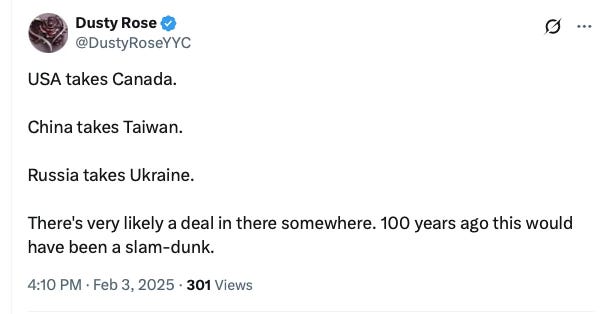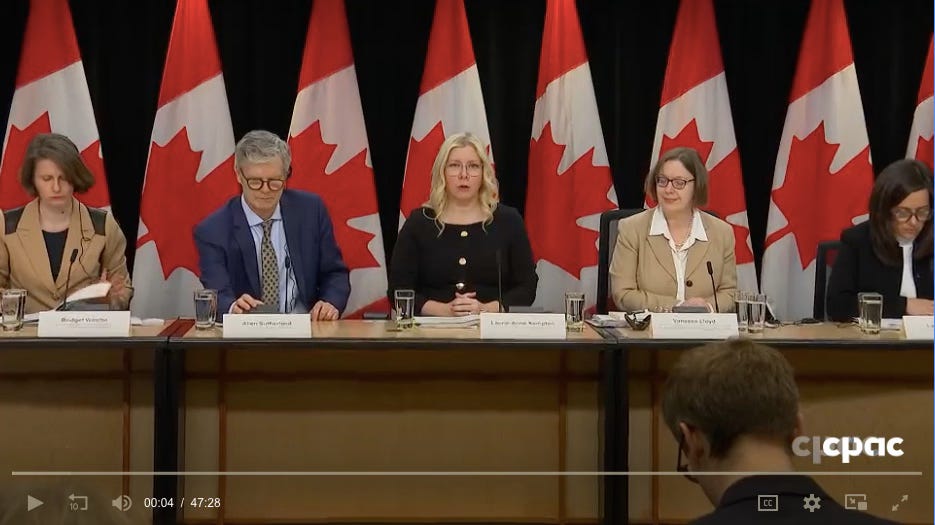Outside Influence 3
As China Boosts Carney, Canada Gets (Slightly More) Vigilant
With Canada’s federal election less than three weeks away, concerns about foreign interference are growing. Here’s a short update:
What the Bots Are Saying
On Twitter/X, the mood music is still favourable to Carney. In a sample taken today, he faced less than twenty percent negative commentary – versus 45 percent for Poilievre and 77 percent for NDP leader Jagmeet Singh.
The same platform has seen a recent spike in activity related to #Wexit, historically a heavily Russia-backed hashtag. Unsurprisingly, many of #Wexit’s most energetic backers have obvious made-in-Moscow calling cards:
Russia-directed bots & proxies on Twitter/X are quiet on the issue of Chinese support for Mark Carney, which was highlighted yesterday by Canada’s Security and Intelligence Threat to Elections (SITE) task force. While the prominent pro-Carney news account in question is state-directed, Moscow and Beijing have legions of inauthentic or anonymous accounts/channels on Twitter/X, WeChat, TikTok, Facebook, YouTube, Instagram and elsewhere. Our tracking and SITE’s report indicate these online assets are actively supporting Carney.
For what it’s worth, I recommend SITE’s 47-minute technical briefing and news conference on CPAC, which reflects rising but still insufficient vigilance:
(Laurie-Anne Kempton, Assistant Secretary to the Cabinet for Communitions, together with members of the SITE task force in Ottawa on April 7, 2025.)
To be clear, neither SITE nor any watchdog in a major democracy has the capability to monitor or counter hostile activity on social media platforms due to their lack of transparency regarding algorithms, curation and ownership of accounts — and the glaring absence of legislation to prevent such meddling. Meta’s discontinuation of fact-checking programmes is adding insult to injury.
US Dimension
With Trump’s global escalation of his tariff threat, Canada has been less of a focus for White House and MAGA influencers. But a group representing Alberta’s self-styled independence movement is preparing to visit Washington shortly.
Foreign-Backed Proxies
Beijing is explicitly supporting Carney after having been caught red-handed working against Chrystia Freeland during the Liberal leadership campaign.
Why the preference? Freeland is a prominent Ukraine supporter who pledged to reach two percent of GDP for defence faster than Carney who has undertaken to reach it “by 2030 at the latest” – which would leave Canada far behind our NATO allies. Moscow and Beijing appear to see Carney – more than Poilievre or Freeland – as less likely to curb their ability to mount influence operations (or ‘active measures’ in KGB and SVR/FSB parlance) with relative impunity.
Such campaigns can pack serious punch. They target business, civil society diaspora and political groups in Canada and the US. The tone they set online affects journalists, political strategists and voters – in ways that often go undetected. Proxy voices, covert operatives and loyalists exert considerable influence, up to and including intimidation and coercion. As the Hogue commission reported, such operations may have swung certain ridings in 2021. Until we address foreign influence on social media platforms, our democracy will remain under threat.
As we grapple with the Paul Chiang fiasco (see Outside Influence 2) and WeChat puffery about Carney, I commend former diplomat Charles Burton, veteran journalist Terry Glavin (who also writes The Real Story) and Sam Cooper’s The Bureau to you – three great sources of ground truth on these issues.




